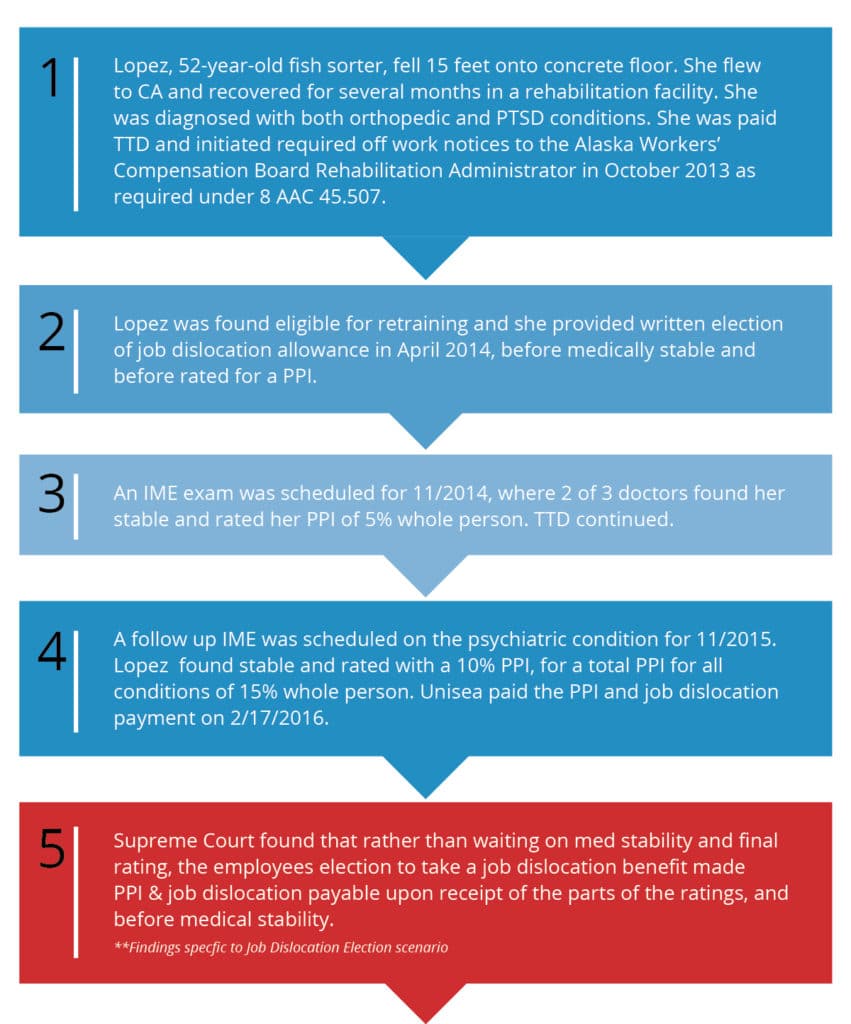The Alaska Supreme Court has released a new decision relevant to the method and timeliness of payments of permanent impairment and job dislocation benefits in workers’ compensation claims. No. 7333 S-16851/61 Unisea, Inc. v. Morales de Lopez
Unlike the opinion of the Workers’ Compensation Board in this case, the Supreme Court determined an insurer should not wait until a worker is medically stable and all parts of a whole person rating is complete before making payment of portions of permanent partial impairment (PPI) ratings and job dislocation allowances. This finding concludes that any undisputed lump sum benefit becomes payable within 21days of receipt of the rating if a worker has elected a job dislocation allowance. This is true even if the worker is not medically stable for all conditions, or portions of a rating have not been concluded.
The facts presented here are specific to an injured worker who was unable to resume employment following a significant injury and was found eligible for retraining under her claim. The worker provided a written election to accept a lump sum job dislocation benefit in lieu of retraining benefits under her workers’ compensation claim.
In accordance with the Alaska Workers’ Compensation Act, there is a sequence of benefits that is common in a scenario of this nature. Generally, a person receives a bi-weekly indemnity benefit of either a Temporary Total Disability (TTD) or Temporary Partial Disability (TPD) until they are released and/or return to work or are found medically stable according to the physician. Once an individual is medically stable, if there is a prediction that they have a permanent partial impairment (PPI), a rating would be performed by a physician under the AMA Guides to the Evaluation of Permanent Impairment. If the worker has also been found eligible for retraining, any PPI rating is payable bi-weekly if the worker proceeds in the rehab process. In this case, the worker elected not to proceed with retraining, and elected to take a lump sum ‘job dislocation allowance’, based upon the percentage of PPI rated.
Although this worker had not been found stable, and rated for all conditions, and therefore was still receiving TTD, the Supreme Court made a clear distinction that PPI and job dislocation is payable within 21 days of receipt when a worker has presented a job dislocation election. Thus, the Supreme Court found Unisea was required to pay the job dislocation benefit corresponding to the orthopedic impairment rating in November 2014 and was required to pay any additional job dislocation benefit due once a rating on the psychiatric condition was received, even while they continued to have a responsibility to pay bi-weekly TTD. Unisea was ordered to pay 25% penalties for their delay in timely payment.
Insurers must use care to distinguish when PPI payments are due in a lump sum, and when a controversion of the method of a lump sum payment is necessary, such as when workers are continuing in the retraining process and benefits are payable bi-weekly.
If an injured worker is found eligible for retraining, an insurer should be watchful of this situation where concurrent types of indemnity benefits may be payable. The court is making it clear that timely payment of any undisputed portion is expected. It also makes it clear that a worker may be due their job dislocation benefit payment before medically stable and rated for all conditions.
To read the court’s decision, click here.

Unisea, Inc. v. Sofia Morales de Lopez, Supreme Court Nos. S-16851/16861

